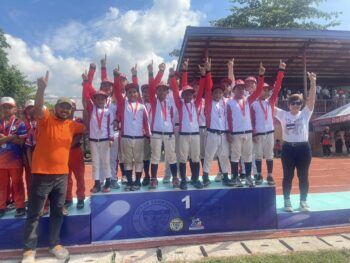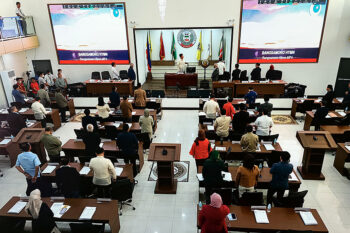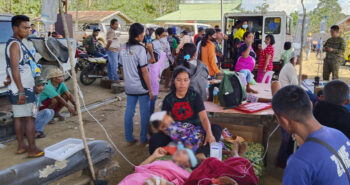GENERAL SANTOS CITY (MindaNews / 30 October) – This is a sequel of “BBL: Transition Makes or Breaks” (COMMENT: MindaNews, October 26, 2014). In that, we quoted and discussed Sections 1 to 7 of Article XVI on Bangsamoro Transition Authority of Draft Bangsamoro Basic Law (House Bill 4994 and Senate Bill 2408). Of the 13 sections of Article XVI, the first seven provides the tremendous task the BTA has to accomplish in less than a year’s time before Bangsamoro will be inaugurated in June 2016.
In this sequel, we are going to discuss more issues arising from Sections 1 to 7 and from the remaining six. Our hope is that the Congress will evaluate properly the significance of “Transition” to Bangsamoro and amend Article XVI as it may be necessary.
Any Other than BTA?
This is a quest for clarification that we think must be made: Section 2 is categorical that the BTA “shall be the interim government or the governing body in the Bangsamoro during the transition period”. This is reiterated in the first two paragraphs of Section 3.
Yet, in the last paragraph of Section 3, the reference is circumstantial — that “the BTA shall be deemed as the Bangsamoro Government for the duration of the transition period”, deemed as such, only for “purposes of mechanisms for intergovernmental relations with the Central Government and local governments units in the Bangsamoro.”
Why “deem it as” if “it is”? It might be just a “mental lapse”. Is there any other body that may relate with the Central Government and ARMM LGUs during the period of reorganization and transfer of power and authority?
Definite or Indefinite?
Paragraphs 1 and 3 of Section 1 definitely state the Transition Period “shall commence upon ratification” of the BBL and “shall end upon the dissolution” of the BTA. This must be the definition of the transition period referred to in Paragraph 4 which “shall be without prejudice to the initiation or continuation of other measures that may be required by post-conflict transition and normalization even beyond the term of the BTA.”
This defines the term of the “BTA”, not of the “Transition Period” which, in fact, may be extended. Unless otherwise defined, the mechanisms and modalities to be established, the ministries and bureaucracy to be organized and the phasing out of the ARMM are “post-conflict transition and normalization” measures. Evidently, it is foreseen that the BTA cannot do all these during its limited term. So, they will be continued and more may be initiated under the umbrella of “other measures” by the regularly elected Parliament.
Should it not be better to fix the term of the Transition Period – say, three years – to be also the fixed term of the BTA so that the regular Bangsamoro Government will not be partly transitional doing the task of the BTA?
Fall Back Clause
To understand and appreciate fully the issue, let’s ponder on “Section 4. Functions and Priorities” providing, “The BTA shall ensure the accomplishment of [four] priorities during the transition period”, namely: (a) enactment of priority legislations particularly four Codes; (b) organization of Bangsamoro Government bureaucracies; (c) transfer of government powers and properties from ARMM Regional Government to Bangsamoro; and (d) other matters that may be necessary for the transition.
In “(a)”, the term “priority legislations” is indefinite. The four codes – Bangsamoro Administrative Code, the Bangsamoro Revenue Code, the Bangsamoro Electoral Code and Bangsamoro Civil Service Code – will take time for research and parliamentary deliberations. Can the BTA accomplish these in one year?
Evidently, the drafters of the BBL foresaw the impossibility; so, this fall back clause as a remedy: “Provided that, until the abovementioned laws are enacted for the Bangsamoro, Muslim Mindanao Autonomy Act No. 25 or the ARMM Local Government Code, and subsisting laws on elections and other electoral matters shall apply in the Bangsamoro.”
Will this fall back clause satisfy the need of the codes specifically for Bangsamoro?
First: ARMM Act No. 25, a rehash of RA No. 7160 or Local Government Code of 1991 will not satisfy the need of the administrative, revenue and civil service codes specifically for Bangsamoro.
Second: During the transition period, the fall back is understandable and necessary. But should these “Codes” not be available for the regular Bangsamoro Government in June 2016, Bangsamoro will operate under ARMM codes and laws and the Omnibus Election Code – a parliamentary and asymmetric government accepting and operating under the unacceptable unitary system.
The fall back clause is not only not a remedy but is also a bad joke.
No Fall Back?
Section 4 states that until the Bangsamoro Election Code is enacted, the “subsisting laws on elections and other electoral matters shall apply in the Bangsamoro”. But this is not consistent with the presumptions in Section 12 on the first Bangsamoro regular election.
Section 12 specifically provides (Break up and numbering ours):
(1) “The first regular elections for the Bangsamoro Government under this Basic Law shall be held on the first Monday of May 2016. It shall be governed by the Bangsamoro Electoral Code.”
(2) “The National Omnibus Election Code shall apply suppletorily, whenever appropriate.”
(3) “The Commission on Elections (COMELEC), through the Bangsamoro Electoral Office, shall promulgate rules and regulations as may be necessary for the conduct of said elections, and enforce and administer the same, consistent with. this Basic Law and the Bangsamoro Electoral Code, as correlated with relevant national laws.”
It is presumed the BTA will be able to enact the Bangsamoro Election Code in time for the May 2016 election to make “(2)” and “(3)” above happen. Should the BTA fail, will the first regular election of Bangsamoro still be held as stated in “(1)” above?
Transition Plan
Section 5 requires that “Within the first sixty (60) days of the transition period, the interim Chief Minister shall submit to the BTA a transition plan that shall contain the proposed organizational plan, as well as the schedule therefor.” Is “transition plan” the overall plan for the Bangsamoro transition or just the “reorganization plan” spelled out in detail in Section 4(b to d) and Sections 6, 7 and 13.?
This must be clarified. Transition is the primary mandate of the BTA? Why should that be assigned to the Interim Prime Minister?
“Organization” and “reorganization” will involve the creation and abolition of offices, the hiring and retiring of personnel. The tasks are sensitive, delicate, and daunting. These will entail a lot of coordination between the BTA vested with the legislative authority and the Interim Prime Minister wielding the executive authority.
Section 6 tasks the interim Chief Minister to “organize the Interim Cabinet” which according to Section 7 “shall be composed of ten (10) primary offices with sub-offices for matters covered and priority ministries”.
Section 7 further provides, “The BTA may empower the interim Chief Minister to create other ministries and primary offices, upon a determination of the majority of its members [of BTA] that the same is necessary for achieving the twin goals of continuity of social services and transitioning to the regular Bangsamoro Government.”
Why is the creation of ministries, a legislative function, delegated to the Interim Prime Minister?
Transition Expenditure
Section 13 provides P1 Billion as the initial funding “To carry out the requirements of transition, including the organizational activities of the BTA, organization of the bureaucracy, hiring of personnel, and the exercise of functions and powers of the BTA, as provided in this Basic Law”.
Is P1 Billion enough for the initial requirement of transition even if “the current year’s appropriations for the ARMM shall also be transferred to the BTA for this purpose” and the initial appropriation “shall be without prejudice to any supplemental budget that may be appropriated by Congress to support the transition”?
The transition expenditure may amount to 100 times P1 Billion. Is the government serious in footing the transition bill? If it is, it must make the proper estimates and provide a one-shot appropriation. The ARMM appropriations for “the current year” are already budgeted or obligated.
Dissolved but Not
Section 11 (Dissolution of the BTA), Paragraph 1, provides: “Immediately upon the qualification of the elected Chief Minister under the first Bangsamoro Parliament, the Bangsamoro Transition Authority shall be deemed dissolved.”
It’s just “deemed” but “not really dissolved” under Paragraph 2, “The BTA shall submit its final report and recommendations to the Bangsamoro Parliament, as well as to the House of Representatives and the Senate, on the status of government during the transition period within sixty (60) days from the assumption into office of all members of the first Parliament.”
Paragraph 1 is “sane and sound”. In fact, the dissolution must be in two phases:
(1) Dissolve the BTA as the Interim Parliament upon the completion by the Regular Parliament of its organization; the BTA turns over to the Regular Parliament all its records including its legislative acts and recommendations if necessary.
(2) Dissolve the interim ministries, as components of the BTA, upon the installation of the regular ministers; each interim minister turns over his office to his regular counterpart including his records and office personnel.
Paragraph 2 is “without rhyme or reason”. Why should the BTA render a report to the two Houses of the Congress? Let the BTA do this to the Regular Parliament as part of the turn-over ceremony, not 60 days after the Regular Parliament has assumed office. The President, the House Speaker, the Senate President, Cabinet Members and Members of the Congress may be invited to witness the turn-over cum dissolution.
The Only Justification
One year Transition Period, the longest possible – can be as short as six months – under prevailing circumstances, is too short for the BTA to complete the edifice most proper for the regular Bangsamoro. Only fools will dissemble this and the drafters of the BBL are not fools.
But the President wants the regular Bangsamoro inaugurated before his term ends on June 30, 2016. GPH peace negotiators have repeatedly said that what the President wants will be done. Only fools will dissemble the foolhardiness of denying the wishes of the President. So the Bangsamoro must be inaugurated before June 30, 2016.
Let the BTA do what it can within the time possible for the Transition Period. The edifice may be far from completed; but let the regular Bangsamoro Government take over from the BTA to complete the transition. This is evident from Draft BBL.
Apparently, this is the only justification for Paragraph 2 of Section 11; for Paragraph 3 of Section 1; and, for the “Provided-clauses” or “fall back” in Section 4(a). This may also explain why only P1 Billion is appropriated for transition expenditures subject to augmentation through supplemental budget from the Congress.
The imperative is clear: Have a fixed Transition Period with fixed fund support enough for the BTA to put in place the structures, mechanisms, modalities, etc. to guarantee the successful launching of the Bangsamoro. Metaphorically, at the end of the Period, the BTA turns over to the first elected regular Bangsamoro Government the edifice or ship ready for its use.
We suggest that the Congress and all others concerned consider this imperative.
(“Comment” is Mr. Patricio P. Diaz’ column for MindaViews, the opinion section of MindaNews. The Titus Brandsma Media Awards honored Mr. Diaz with a “Lifetime Achievement Award” for his “commitment to education and public information to Mindanawons as Journalist, Educator and Peace Advocate.” You can reach him at patpdiazgsc@yahoo.com.)







